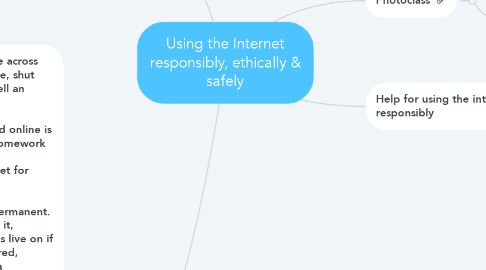Using the Internet responsibly, ethically & safely
by Brennan Nicholl

1. Photoclass
1.1. A safe photo website covered by creative commons
2. Help for using the internet responsibly
2.1. A website with help links for anybody that feels threatened online
3. Cyber Security
4. If you accidentally come across something inappropriate, shut off the computer and tell an adult. Not everything you read online is true. From rumors to homework resources, no one is fact-checking the Internet for accuracy. Whatever you post is permanent. Even if you later delete it, images, text, and videos live on if anyone has already shared, downloaded, or taken a screenshot of them. >Don't say things online that you wouldn't say to someone's face. The Internet can encourage rude behavior and group-think. Don't engage in cyberbullying. No clicking on the “stuff” on the sides of webpages, like ads or off-site links, without permission. Only chat online with people you know and trust in real life. If you get an email or message from someone you don't know, don't write back and don't click on any attachments to the email. Even if you know the sender and it sounds funny, tell an adult. Always ask permission before downloading or uploading things. Don't write about yourself where anybody can see it. Set privacy settings tightly and don't give out your name, age, school, address, birthday, or any of your other personal stats in a public Internet forum. Keep your passwords to yourself. Don't share with anyone (except a parent) and change them often. Use a combination of letters, numbers, and special characters that you can remember but is really hard for anyone else to guess.


